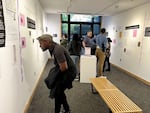
A crowd studies the exhibit “Sweeter Than the Onions: Stories of Queer Resilience in Walla Walla,” at Whitman College.
Courtney Flatt / Northwest News Network
The meeting room at Whitman College had space for about 50 people. That wasn’t nearly enough for historian Nikki Brueggeman’s presentation on queer oral histories in the Walla Walla Valley in Washington state. People stood and sat in every available space.
“It kind of made me feel validated in a way of like, ‘I told y’all, we were here.’ The community showed up and they wanted to hear the stories. They wanted to feel represented,” Brueggeman said, after a presentation about her exhibit, “Sweeter Than the Onions: Stories of Queer Resilience in Walla Walla.” The exhibit coincides with Pride Month, which is in June.
Queer people always have lived in the area, even if it wasn’t obvious, she said.
“The presence of queer people in public spaces is not some woke agenda. It’s just people coming out and being honest with the public about who they are,” Brueggeman said.
Related: Statewide survey of LGBTQ+ Washingtonians to launch next year
That still might not be easy today, but Brueggeman said it was even harder a century ago, when the Ku Klux Klan headed businesses, banks, churches, and political arenas.
“Systemic oppression and hate when you have housing inequality, when you have banks and institutions rejecting people on the basis of who they love, when you have people living in fear of retaliation for their identity, when you have a hate group that the the community actively participates in, that is not the case of the bad apples or two, that is the case of an orchard with an illness,” she said.
That oppression not only falls on racial divides. It also creates injustices for queer people, Brueggeman said.
Homophobia in ‘70s Rogue Valley
During her dive into her community’s history, Brueggeman read articles and opinion pages in the Walla Walla Union-Bulletin. One that surprised her told of an infamous debate held at Whitman College in 1978.
On the podium stood a gay activist from Seattle, a clergyman who worked at Walla Walla State Penitentiary, a female college professor, and an anti-gay activist from the Tri-Cities.
Then came the Q&A following the debate.
“Basically the room went very chaotic the minute that the audience got the microphone, and I was like, ‘Yeah, I can see how that would be,’” she said.
Related: After a shocking removal, Washington Capitol memorial honoring LGBTQ lawmaker reinstalled
Quoting from the article, which uses outdated language, Brueggeman said, “‘A young mother, baby in arms and visibly shaken, said she feared for her children, that a homosexual might be a teacher of theirs someday.’ This really gives us a taste of what the Valley was like in the late ‘70s.”
Brueggeman and two assistants collected 16 oral histories from queer people who lived in the Walla Walla Valley over the last 50 years. More oral histories are in the works, Brueggeman said.
“I fell in love with the possibilities of what you can do with an oral history,” she said. “That it allows communities, through their own narratives, own perspectives and personal experiences, to tell people what has happened.”
More oral histories in the works
During the hourlong interviews, many spoke of the burgeoning community they found, including an oral history from Doug Taylor. He reminisced about barnyard parties in the 1990s.
“They would rent one of the meeting halls in Touchet and would have a Saturday night dance and socials. People would come in from all over Tri-Cities, Walla Walla, Spokane, just because there was not a lot that happened anywhere, anyplace,” Taylor said.
According to census records, only 467 people lived in Touchet during that time.
“(The Touchet meetups are) the most rural thing that I’ve heard of,” Brueggeman joked during her presentation. “The last time I’ve heard of something this rural and queer was when I was in college (at Washington State University) driving out to Moscow, Idaho, to go to the drag show.”
At Whitman College, the queer network is growing, said John Johnson, the vice president for the Division of Inclusive Excellence at the college.
“Some 42% of students in the Class of 2027 identify as LGBTQIA+. We are striving to become a queer thriving institution,” he said.
For audience member Heather Owens, seeing so many people with so many queer stories felt like home. Owens moved here from Asheville, North Carolina, to help an aging parent.
“One of my mom’s first pieces of advice was don’t volunteer for anything and don’t come out, which apparently, I volunteered, and I came out,” she said, laughing.
However, not taking her mom’s advice worked well, she said. Owens said she now goes to an affirming church and has met good friends.
This oral history exhibit lifted her spirits even more, she said.
“I really got to be around my people. Sometimes you miss that,” Owens said.
Brueggeman said she hopes to expand this oral history project to other queer people in eastern and central Washington and eventually the entire state. Whitman College’s David Nord Award funded her project. Nord was a gay man who established an endowment.
“These oral histories and the times and the community that they’re describing, I believe that reveal a resilience that’s extremely beautiful,” she said.
Whitman College will display her oral history, “Sweeter Than the Onions: Stories of Queer Resilience in Walla Walla,” exhibit through June.
Produced with assistance from the Public Media Journalists Association Editor Corps funded by the Corporation for Public Broadcasting, a private corporation funded by the American people.